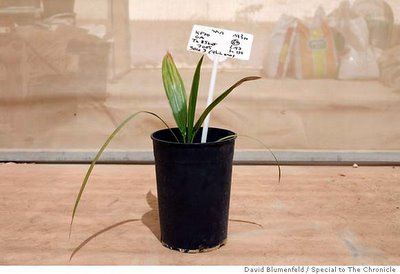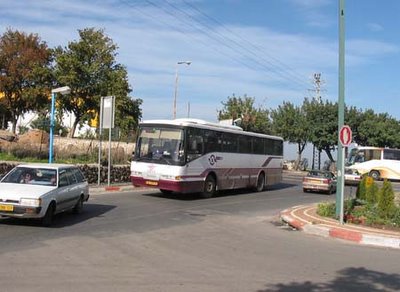 Update: 2000 Year Old Palm Tree Seed Growing In Jerusalem
Update: 2000 Year Old Palm Tree Seed Growing In Jerusalem

Here's an update to a story that appeared in the New York Times back last June. I've reprinted the NYT story below the recent Arutz-7 one.
Arutz-7's Ezra HaLevi reports:
2,000-Year-Old Judean Date Seed Growing Successfully
Monday, January 30, 2006 / 1 Shevat 5766
A 2,000 year old date seed planted last Tu B’Shvat has sprouted and is over a foot tall. Being grown at Kibbutz Ketura in the Arava, it is the oldest seed to ever produce a viable young sapling.
The Judean date seed was found, together with a large number of other seeds, during archaeological excavations carried out close to Massada near the southern end of the Dead Sea, the last Jewish stronghold following the Roman destruction of the Holy Temple. The age of the seeds was determined using carbon dating, but has a margin of error of 50 years – placing them either right before or right after the Massada revolt.
The seeds sat in storage for thirty years until Elain Solowey of the Arava Institute for Environmental Studies was asked to attempt to cultivate three of them. Solowey spoke with Israel National Radio's Yishai Fleisher and Alex Traiman about reviving the ancient date palm.
Solowey, who raised the plant, has grown over one hundred rare and almost extinct species of plants. Together with Hadassah Hospital’s Natural Medicine Center, she seeks to use the plants listed in ancient remedies to seek effective uses for modern medical conditions. The Judean date has been credited with helping fight cancer, malaria and toothaches. Solowey was skeptical about the chances of success at first, but gave it a try. “I treated it in warm water and used growth hormones and an enzymatic fertilizer extracted from seaweed in order to supplement the food normally present in a seed,” she said.
As this year’s Tu B’Shvat (The 15th of the Jewish month of Shvat, the Jewish new year for trees) approaches, the young tree that sprouted from one of the three seeds now has five leaves (one was removed for scientific testing) and is 14 inches tall. Solowey has named it Metushelah (Methusaleh), after the 969-year-old grandfather of Noah, the oldest human being recorded in the Torah.
Solowey said that although the plant’s leaves were pale at first, the young tree now looks “perfectly normal.”
The Judean palms once grew throughout the Jordan Valley, from Lake Kinneret (the Sea of Galilee) to the Dead Sea. Those from Jericho, at the northern end of the Dead Sea, were of particularly notable quality. Though dates are still grown widely in the Jordan Valley, the trees come mostly from California.
The Judean date palm trees are referred to in Psalm 92 (“The righteous shall flourish like the palm tree…”). The tree was also depicted on the ancient Jewish shekel and now appears on the modern Israeli 10-shekel coin.
It is too early to tell the sex of the tree, but if it is female, it is supposed to bear fruit by 2010, after which it can be propagated to revive the Judean date palm species altogether. “It is a long road to our being able to eat the Judean date once again,” Solowey said, “but there is the possibility of restoring the date to the modern world.”
Here's the story that ran in the The New York Times in June:
After a 2,000-Year Rest, a Seed Sprouts in Jerusalem
June 12, 2005
By STEVEN ERLANGER
JERUSALEM, June 11 - Israeli doctors and scientists have succeeded in germinating a date seed nearly 2,000 years old.
The seed, nicknamed Methuselah, was taken from an excavation at Masada, the cliff fortress where, in A.D. 73, 960 Jewish zealots died by their own hand, rather than surrender to a Roman assault. The point is to find out what was so exceptional about the original date palm of Judea, much praised in the Bible and the Koran for its shade, food, beauty and medicinal qualities, but long ago destroyed by the crusaders.
"The righteous shall flourish like the palm tree," says Psalm 92. "They shall still bring forth fruit in old age. They shall be fat and flourishing."
Well, we'll see. Dr. Sarah Sallon, who runs a project on medicinal plants of the Middle East, notes that the date palm in ancient times symbolized the tree of life. But Dr. Elaine Solowey, who germinated the seed and is growing it in quarantine, says plants grown from ancient seeds "usually keel over and die soon," having used most of their nutrients in remaining alive.
The plant is now 11.8 inches tall and has produced seven leaves, one of which was removed for DNA testing. Radiocarbon dating in Switzerland on a snip of the seed showed it to be 1,990 years old, plus or minus 50 years. So the date seed dates from 35 B.C. to A.D. 65, just before the famed Roman siege.
Three date seeds were taken from Level 34 of the Masada dig. They were found in a storeroom, and are presumably from dates eaten by the defenders, Dr. Sallon says.
Mordechai Kislef, director of botanical archeology at Bar-Ilan University, had some date seeds from Ehud Netzer, who excavated Masada in the 1970's. "They were sitting in a drawer, and when I asked for one, he said, 'You're mad,' but finally gave me three," Dr. Sallon said. "Then I gave them to Elaine, who's an expert on arid agriculture and dates." Dr. Solowey said: "Well, I didn't have much hope that any would come up, but you know how Sarah is."
Dr. Sallon, who is a pediatric gastroenterologist trained at University College, London, came to Israel 20 years ago. She is the director of the Louis L. Borick Natural Medicine Research Center at Hadassah Medical Organization, which she set up 10 years ago to study natural products and therapies, from Tibetan and Chinese medicine to the indigenous medicinal plants of the Middle East. The idea is to preserve these plants and their oral histories in a modernizing region, but also to domesticate them, evaluate them scientifically and then try to integrate them into conventional medicine.
Dr. Solowey, who teaches agriculture and sustainable farming at the Arava Institute for Environmental Studies, based at Kibbutz Ketura in the southern Negev, works on finding new crops for arid and saline areas like Jordan, Gaza and Morocco. She also works with Dr. Sallon to domesticate indigenous plants that appear to have medicinal uses.
Dr. Solowey grew up in the San Joaquin Valley in California and studied horticulture, then turned away from commercial agriculture in disgust, coming here in 1971. "I don't come to organic agriculture from the hippie side, but as a frustrated agricultural scientist," she said.
"We've bred for yield and taste, but not hardiness, so we have a lot of plants as hardy as French poodles, so we have to spray to protect them, and then we pay the price," she said. "There isn't a cubic centimeter of water in the San Joaquin Valley that isn't polluted with something."
She planted the date seeds at the end of January after trying to draw them out of their deep dormancy. She first soaked the seeds in hot water to soften the coat, then in an acid rich in hormones, then in an enzymatic fertilizer made of seaweed and other nutrients.
"I've done other recalcitrant seeds," she said. "It wasn't a project with a high priority. I had no idea if the food in the seed was still good, but I put them in new pots in new potting soil and plugged them into drip irrigation and kind of forgot about them."
About six weeks later, she said, "I saw the earth cracked in a pot and much to my astonishment, one of these came up."
The first two leaves looked odd, she said, very flat and pale. "But the third looked like a date leaf with lines, and every one since has looked more and more normal - like it had a hard time getting out of the seed."
Lotus seeds of about 1,200 years of age have been sprouted in China, and after the Nazis bombed London's Natural History Museum in World War II and a lot of water was used to put out the fire, seeds of 500 years of age also germinated.
"But no one had done it from 2,000 years old," Dr. Sallon said.
In the time of Pliny, forests of date palms covered the area from Lake Galilee to the Dead Sea and made Jericho famous; a date palm features on ancient coinage, as it does on the current Israeli 10-shekel coin.
The date palm symbolized ancient Israel; the honey of "the land of milk and honey" came from the date. It is praised as a tonic to increase longevity, as a laxative, as a cure for infections and as an aphrodisiac, Dr. Sallon said. But the dates of Judea were destroyed before the Middle Ages, and what dates Israel grows now were imported in the 1950's and 60's from California and originated elsewhere in the Middle East.
The Prophet Muhammad considered the date of great importance for medicine, food, construction and income, and it is described in the Koran as a "symbol of goodness" associated with heaven.
Dates need to grow 30 years to reach maturity and can live as long as 200 years.
But it is the female date that is considered holy, and that bears fruit. "Men are rather superfluous in the date industry," Dr. Sallon said.
"O.K, I have a date plant," Dr. Solowey said. "If it lives, it will be years before we eat any dates. And that's if it's female. There's a 50-50 chance. And if it's a male, it will just be a curiosity."











 :
:


